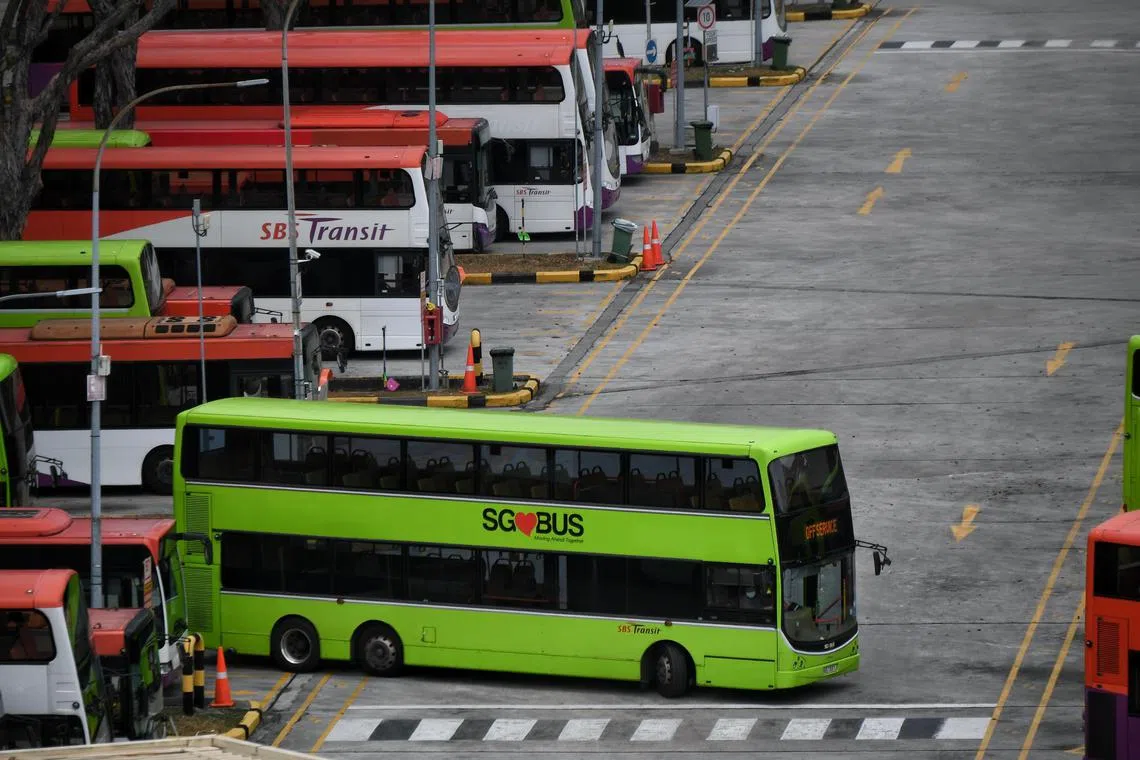Firms from Hong Kong and Spain among five bidders for Seletar public bus contract
Sign up now: Get ST's newsletters delivered to your inbox

Existing operators SBS Transit, SMRT Buses and Tower Transit Singapore also participated in the tender, which closed on March 4.
ST PHOTO: KUA CHEE SIONG
Follow topic:
SINGAPORE – Hong Kong public transport company Bravo Transport Holdings and Nex Continental Holdings from Spain were among five companies that bid for a government contract to run a set of public bus services called the Seletar bus package.
Existing operators SBS Transit, SMRT Buses and Tower Transit Singapore also participated in the tender, which closed on March 4. These three, along with Go-Ahead Singapore, are the operators currently running all of Singapore’s public bus services, which are bundled into 14 packages by geographic area.
Submissions for the tender, which was called on Oct 30, 2023, will be evaluated by the Land Transport Authority (LTA) using a two-envelope process, which means the quality of the technical proposal will be evaluated before looking at the bid prices. Bid prices of shortlisted applicants will be disclosed after the contract is awarded.
LTA told The Straits Times on March 6 that it aims to award the tender by the end of 2024.
The Seletar bus package currently comprises 29 bus routes that serve areas including Yio Chu Kang, Ang Mo Kio and Shenton Way. First offered for tender in 2016, the package has been operated by SBS Transit since 2018 after it won the contract with the lowest bid of $480.3 million.
The five-year contract, which was later extended for two years, will end in March 2025. It was SBS Transit’s first bus tender award under Singapore’s bus contracting model adopted in 2016.
SBS Transit is “committed to doing more to elevate passenger travel experience, promote inclusive travels, strengthen our operational excellence, and drive sustainable initiatives and practices”, spokeswoman Grace Wu told ST.
Deputy managing director of SMRT Buses Vincent Gay said: “We have submitted a competitive bid for the Seletar bus package. SMRT Buses is keen to serve commuters and communities in the north-east region of Singapore.”
Mr Winston Toh, Tower Transit Singapore’s managing director, said his company put in a “value-for-money proposal”.
“We remain keen on opportunities to grow our business in Singapore,” he said.
Tower Transit, a bus operator under Australian transport company Kelsian Group, entered the Singapore market after winning the inaugural government bus contract for the Bulim bus package in May 2015. The company rolled out a real-time tracking and sensor system on its buses in July 2016 that doubled its drivers’ safety scores
Local and foreign players can bid for bus packages under Singapore’s bus contracting model, which was adopted to raise service standards and inject competition.
Their bid price indicates the proposed fee that they would be paid to run bus services at standards set by LTA, which owns all the operating assets and infrastructure, plans bus services centrally, and collects fare revenue.
National University of Singapore associate professor Raymond Ong expects that SMRT Buses and Tower Transit would have put up credible bids, but said SBS Transit, as the incumbent, has the tactical advantage.
“(SBS Transit) has been dealing with existing operations, and they know the ground to bid competitively,” said Prof Ong, who researches transport infrastructure.
For foreign operators to win a bid here, they must not only submit financially attractive proposals, but also demonstrate an ability to provide high maintenance and service levels, he added.
However, Associate Professor Walter Theseira said foreign players “usually lack sufficient local knowledge”.
This generally makes it challenging for them to convince LTA that they can meet operating targets as part of the quality criterion and price the package competitively, he said.
“This is part of the reason entry into contracting markets is difficult without local partnerships,” said Prof Theseira, who heads the urban transportation programme at the Singapore University of Social Sciences.
He added that foreign operators have a higher chance of success if they can add value “in terms of potentially productivity-enhancing operating concepts, or lower costs”.
Hong Kong Island’s largest bus company Bravo Transport is hoping to do that by carrying over to Singapore its experience in moving large numbers of people safely and efficiently.
The operator of more than 1,700 Citybus vehicles covering more than 210 routes has an annual ridership of about 350 million, and employs over 5,000 people in Hong Kong.
“Both Hong Kong and Singapore are leading cities when it comes to buses. We constantly seek to improve our operations in Hong Kong and challenge the status quo,” a spokesperson from Bravo Transport said, citing initiatives it introduced, such as Hong Kong’s first electric double-decker bus and first hydrogen fuel cell double-decker bus.
Nex Continental is a subsidiary of Britain-based transport operator Mobico Group, which also bid for the Seletar package in 2016, when it was then known as National Express Group.
More recently, the National Express Group also bid for the Bukit Merah and Jurong West bus packages, which in August 2023 were awarded to SBS Transit and SMRT Buses respectively
Besides Britain, Mobico operates urban bus services in places including Spain, Ireland, Portugal, Switzerland, France, Morocco and Bahrain. The company declined to comment when contacted.

